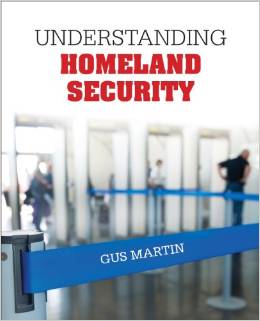Offering valuable insight into the complexities of protecting the nation from both external and internal threats, C. Augustus (Gus) Martin’s textbook Understanding Homeland Security (Sage Publishing, June 2014) provides students and professionals a straightforward, modern-era exploration of this dynamic topic.
With Martin’s ease-of-navigation writing style and knowledge in the field, his book provides “fundamental expertise” and stimulates critical thinking while delving extensively into emergency management, terrorism, criminal intelligence, armed conflict, social environments and other areas.
Martin began teaching at Cali fornia State University, Dominguez Hills (CSUDH) in 2001 as an assistant professor. He moved up the faculty ranks before joining the administration where he first served as associate vice president of Faculty Affairs for seven years. He currently teaches the course Terrorism and Extremism while serving (since January 2014) as associate vice president for Human Resources Management.
fornia State University, Dominguez Hills (CSUDH) in 2001 as an assistant professor. He moved up the faculty ranks before joining the administration where he first served as associate vice president of Faculty Affairs for seven years. He currently teaches the course Terrorism and Extremism while serving (since January 2014) as associate vice president for Human Resources Management.
Unlike his first six textbooks that focused on international terrorism, his latest tackles–in a broad sense–how the US government responds, or “decides to respond,” to domestic security.
“Homeland security is a relatively new concept in the U.S. Some countries in Europe have had these types of agencies going back a couple generations,” said Martin. “Our approach to terrorism before 9/11 was law enforcement. We now have a more national security environment in this nation. The general structure is we first try to predict when terrorism will happen, then try to prevent it, and then, if something does happen, we shift focus to how we respond. Every law enforcement agency in the country, down to county sheriffs, has a homeland security component to it. It’s part of our culture.”
Government information is public record and is available in reports from the U.S. Senate, intelligence agencies and other sources, and Martin taps those resources often. But he more frequently gathers information from reputable human rights organizations, such as Doctors Without Borders and groups that work in refugee camps. Their data can be more extensive due to the security issues related to the work they do, according to Martin.
“Sometimes these people find themselves in danger. They often work in war-like conditions so their organizations put out a lot of detailed information,” he said. “These individuals are soft targets and the terrorists look for them. Books like Understanding Homeland Security would be a good resource for doctors and others who put their lives on the line to help others.”
Martin is, however, concerned about how the U.S. government has thrown the “kitchen sink” into homeland security, including natural disasters such as hurricanes and earthquakes.
“Terrorism, that’s what we need to keep our focus on. If we get too broad or spread out too thin we could lose some of our edge when it comes to responding to real terrorist situations,” he said.
There are also civil liberty concerns to consider when it comes to the homeland security, according to Martin.
“We have a lot of watchdogs paying attention to what the government is doing in terms of homeland security and counterterrorism. With the kinds of surveillance security that is now available to governments, they need to be monitored,” he said. “Generally people accept the current security environment because they know the bad guys are out there–they walk among us. So we accept this, but we have to be vigilant. We have to be very careful how we apply homeland security.”

Head of the Class
Martin teaches the class Terrorism and Extremism in the Criminal Justice Administration division in CSUDH’s College of Business Administration and Public Policy. He also has taught terrorism at the University of Pittsburgh.
“When I teach my terrorism course I essentially teach the students everything there is to know on the subject,” Martin explained. “We look at history, causes, and how to define terrorism, as well as the different types; religious, ideological, Marxist, fascist, and international terrorism. We also focus on counter terrorism in the United States and our ‘homegrown’ extremists. So there’s a whole lot to study before jumping into homeland security.”
Martin uses Understanding Homeland Security to guide his course. He leads his students in some “fascinating” directions and unique class projects, which has made a few a “bit nervous” when they were on particular websites.
“My students write papers and can earn extra credit that involves different types of research, like on the Internet, and there’s a lot out there on the web,” he said. “Terrorists and extremists have their own websites and they use social media just like anyone else. Some non-violent extremists just push their ideologies. My students find everything you can think of online, such as how to make weapons and bombs, and where to place them.”
Martin believes most Americans have adjusted well to the idea of homeland security, but he does hear a lot of mislabeling of individuals and groups as terrorists. With his new textbook, he provides a “reality check” for readers. He wants his students and other readers to really understand who the terrorists are and to “get past the conspiracy theories and fallacies” about terrorism and national security.
“People use the word ‘terrorist’ much too openly. Not everything is terrorist. I’ve asked students in my class, ‘Are gang members terrorists?’ and some say ‘Yes!’ But they’re not. There has to be a political motivation. Gangs are just into it for the money,” he said. “I think it’s important for everyone to know what to look for or be trained to some degree, even in the private sector.”
Martin’s course enrolls a diverse group of students, from law enforcement officers and criminology students, to sociology majors and seasoned combat veterans.
“It’s a good mix. The veterans know this stuff. They’ve been trained in it and they’ve seen it. Sometimes they talk to me about what they know and sometimes they don’t,” he said. “Law enforcement officers and those who want to go into that field know they’re going to have to deal with homeland security and terrorism. So that’s why they’re in my class.”